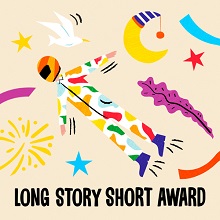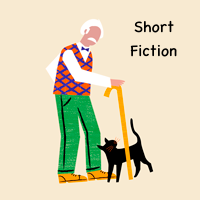Once upon a time, in the softness and perfect blossoming of a July summer, a butterfly was fluttering at the whim of the wind, under the knowing gaze of the sun. She flew high in the sky, highe ... [+]
Stevik was a Survivor, one of the very few people who remained. Everyone else had either died or fled, looking not to the earth for their salvation, but the cold, distant stars. They had boldly, brazenly ventured forth in search of a new home, content to leave their cradle in ruins as they took their next steps towards eternity.
Some of them had stayed. Some hoped to gain dominance over the world, to force anyone who remained into the contemptible bonds of the slavery of antiquity. Some had stayed out of fear, preferring to perish in the pollution they had created than suffocate in the emptiness of the vacuum just past the sky. Others had hope to make a difference, to slowly nurse their world back to health, and one by one undo the millennia of murder and villainy and rape perpetrated by billions and billions of people. All of them were doomed in one way or another; they would fall victim to man, disease, or time. The best of them hoped that someone would pick up where they left off, and continue leading Gaia on the long road to health.
This had been Stevik’s story. He had been born four generations after the Exodus, and was raised in the hope that someday, his children’s children’s children’s children might be able to walk the earth at dusk without wearing a mask. Stevik was raised to revere his world, and raised his two children the same way, hoping for them to live long after he had become a part of that which he sought to protect.
And then, in the blink of an eye, they were gone. Nala and Tiber, the stars in his eyes, were snuffed out. Their little tongues of flame and glimmers of light were gone forever, and the moment he learned of their deaths, his own candle waned to the dimmest of glows. His wife followed soon behind her darlings; she had loved him for what they had made together, not for what he could do himself, and when they were gone, half of her was as well.
He didn’t give up, but he knew his work would never mean the same to him again. And so he picked up his bag and left. He had walked out into the desert to the west, carrying a jar of water and a few morsels of food. He didn’t know what he was looking for; hope, salvation, God? Everything was a blur to him, a mural of sand and wind and tears and rage.
That is where he had found it. Really, that is where it had found him. The machine had been there before he was born, lying motionless in the sand, and yet, as he stumbled through the sand just after nightfall, it surprised him. Although deep down he knew it was ridiculous, he felt that somehow the wilderness had heard his screams, felt his tears watering the parched earth, and given him an answer.
The machine had been built to fly, to carry cargo and people in its now-empty belly from the earth to the sky, and leave them hanging in the void. At the end of the age, it had landed in the desert, with its veins still full of fuel but its crew devoid of hope. They had left it there to be buried in the slowly shifting sands, and what became of them Stevik did not know. But he had found it there, half-buried in the ground, and spent an eternity digging it out. It seemed like every time he blinked a sandstorm would scream in from the west and destroy all his work, filling the lonely man’s feeble trenches with a shriek of raw hatred, and he would have to start anew.
He did not begrudge the wind its fury. He had seen what his kind had done to the land, the gaping scars carved deep into the flesh of the earth, slowly sapping away the lifeblood of the land. He had felt the tremors of the planet, the mines and wells slowly caving in as the earth reclaimed what man had stolen. And he could still taste the merciless, metallic tang in the air when he took off his mask, and see the sooty haze on the horizon to the east in the light of the setting sun behind him.
The machine was his quest, really. It hadn’t swooped through the skies in hundreds of years, and yet he took it upon himself to resurrect the whitened bones of the desiccated bird, hoping that he could be the first living creature to fly above the earth again in generations. To an outsider, it was absurd, and Stevik would have agreed with them had he been who he used to be before the accident. But now, he devoted himself wholeheartedly to the impossible task.
And somehow, he finished. The wind held off long enough for his trenches to take shape, and in the brilliant brightness of the morning, he clambered up into the cockpit, buckled the harness, and threw on the switches. The dragon roared to life, spewing tongues of fire from his twin maws, and then gracefully rose into the sky.
With his hands gently guiding it, the massive machine sailed through the acidic air, punching through the veils of blackish-blue clouds with a guttural roar, and tracing graceful spirals through the heavens. Far below him, Stevik could see the minuscule forms of his neighbors, sprinting through the doors of the enclave and staring with masked eyes at the mighty beast of old screeching with triumph through the sky. Stevik waved down at them, and then aimed the mighty machine towards the awesome light in the sky 92 million miles distant and closed his eyes.
And for the first time in as long as he could remember, Stevik smiled.
That is how the search party had found him, lying back on the side of a sand dune several miles into the desert, with an empty jar of water by his side, a crooked smile on his face, and a child’s battered plastic spaceship in his hand. Whether he had died more of grief or dehydration none of them could say, but they buried him in the sand there were he had found some solace in his last hours, and willed him become a part of the earth he had worked so hard to resurrect. No tombstone marked his final resting place there in the desert, and as the last man looked back, all he could see was the unnatural glint of the toy rocket ship sticking defiantly from the already-shifting sand. And then he shook his head, turned, and walked in the way of his brothers.



